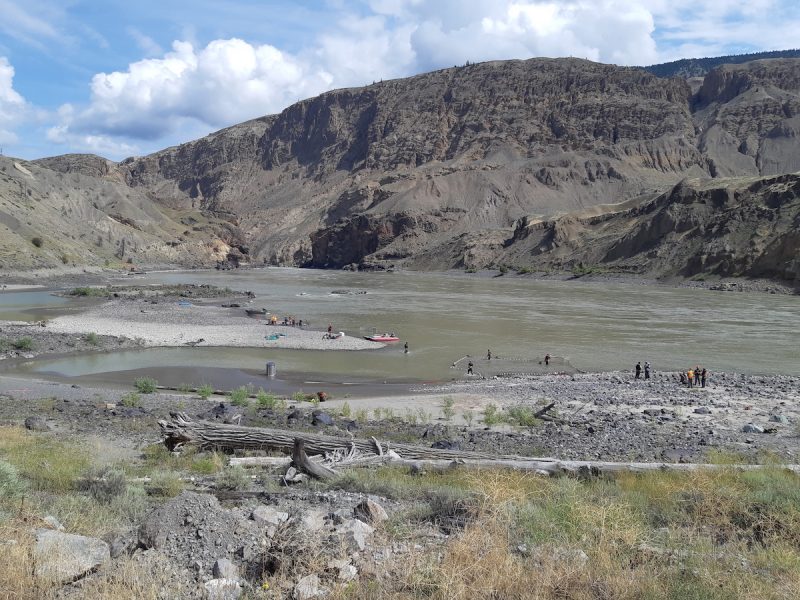Landslide blocking migrating salmon is “spectacular” as it is “daunting”
“There is no higher priority for me and for my department in British Columbia than addressing the Big Bar landslide on the Fraser River,” – Bernadette Jordan, Canada’s new Fisheries Minister
By Fabian Dawson
SeaWestNews
The Big Bar landslide on the Fraser River that is threatening several Pacific salmon populations with extinction is “spectacular” as it is “daunting,” said Bernadette Jordan, Canada’s new Fisheries Minister, after a visit to the remote natural disaster site in British Columbia’s interior.
The slide, the size of a building that is 35 storeys tall and 18-storey across, has created a barrier to the vital seasonal northward Fraser salmon migration in an area about 60 kilometres north of Lillooet.
“There is no higher priority for me and for my department in British Columbia than addressing the Big Bar landslide on the Fraser River,” said Jordan.
After the slide was discovered last June 2019, with estimates showing 75,000 cubic metres of material deposited in the river, an emergency response team swung into action transporting the stranded salmon by helicopter and trucks to their spawning grounds while rock scalers removed large boulders to create a natural passage.
The Department of Fisheries and Oceans (DFO) estimated last month that 275,000 salmon managed to get past the slide after adjusting the number of returning Fraser River sockeye expected in 2019 to a little more than 600,000, down from an earlier projection of nearly five million.
The populations most affected by the slide have been early Stuart sockeye, two groups of spring and chinook salmon and the Interior Fraser Coho population.
“We know how integral these salmon stocks are to our ecosystem and to the communities up and down the Fraser River,” said Jordan after seeing first-hand the ongoing work to address the slide.
“We’re moving swiftly with the next phase of our response, in collaboration with First Nations, the Province of BC, and industry partners, and are hopeful this will lead to a lasting solution for safe fish passage,” she said.
The government has awarded a $17.6 million contract to Peter Kiewit Sons ULC to undertake the extensive remediation efforts at the site through the winter months.
The remediation work will include breaking up and removing rock debris from the landslide to improve passage for salmon and steelhead stocks during the upcoming migration season. This project will begin immediately and will continue through to the end of March 2020.
Jordan also announced two technical working groups of experts from governments, stakeholders, non-profit organizations, and academia, that will help inform comprehensive contingency and remediation plans for alternate fish passage methods and conservation-based enhancement.
Additional options for safe fish passage are being developed in case the height or water velocity presents a barrier to certain salmon populations during the early part of the 2020 migration season.
Jordan, who was accompanied by Terry Beech, Parliamentary Secretary to the Minister and Member of Parliament for Burnaby North-Seymour, also met with the High Bar and Stswecem’c Xgat’tem Nations and the Fraser Salmon Management Council.
“As First Nations, our identities rely on these salmon; we have a long-shared history with both the salmon and the Fraser River itself. It is crucial this be done in partnership, and the Big Bar Landslide response is a good test for how government can recognize the rights, title and responsibilities of the Secwepemc Nation,” said Chief Harry Patrick of the Stswecem’c Xgat’tem First Nation.
High Bar First Nation Chief Roy Fletcher said; “We are happy that work is now moving forward to help the fish move past the landslide, always keeping in mind worker safety. It is important to recognize moving forward what we are doing together here can be an example of true government-to-government cooperation, if we do it right. “
Quick facts
- DFO was notified of a landslide near Big Bar, British Columbia on June 23, 2019.
- In early September trap and transfer, plus lower water levels combined with the partial re-establishment of natural fish passage, resulted in thousands of salmon migrating above the slide site.
- Since October of 2019, when the emergency response transitioned to an ongoing project response, work has continued to prepare for major winter rock remediation work. A specialized excavator continued rock manipulation to improve access to the site, geotechnical and hydrological experts regularly monitored slope stability and water levels, engineering design work was undertaken, and archeological assessment work is underway in partnership with local First Nations.
- On December 31, 2019, Public Services and Procurement Canada, on behalf of Fisheries and Oceans Canada, awarded a contract of $17.6 million to Peter Kiewit Sons ULC for remediation work on the site. This work is expected to be substantially completed by the spring freshet, which is currently anticipated to take place in mid-to-late March 2020.
Image courtesy of B.C. Government shows response teams at the Big Bar Landslide trying to help stranded salmon move to their spawning grounds
